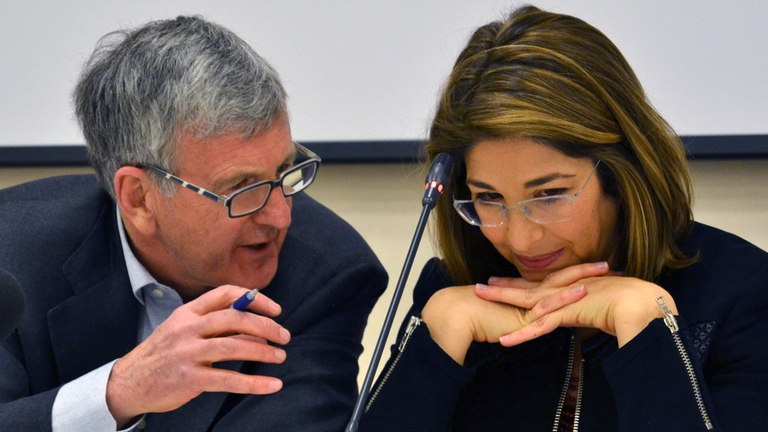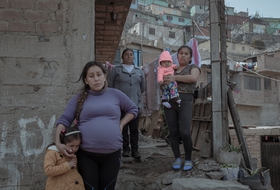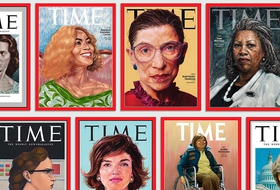
One in three women have suffered physical or sexual violence. With contributions from Europe, Africa, Asia and Latin America, we look at how this shadow pandemic affects every corner of the world.
Naomi Klein, in her latest essay This Changes Everything: Capitalism vs. The Climate, starts with the basic assumption that without a radical change in the way in which people live, produce and manage their economic activities, there is no way to avoid environmental destruction. 15 years after the publication of No logo, the bible of the anti-globalization
Naomi Klein, in her latest essay This Changes Everything: Capitalism vs. The Climate, starts with the basic assumption that without a radical change in the way in which people live, produce and manage their economic activities, there is no way to avoid environmental destruction.
15 years after the publication of No logo, the bible of the anti-globalization movement in the 2000s, Klein tries to deal with social issues caused by capitalism from another perspective, that of global warming as a direct consequence of people’s unawareness that causes them to exploit resources and be careless of the effects of our actions on the environment and climate. In the last few days, the Canadian author has been to Italy in order to present her last book. The first meeting was organised by Festivaletteratura in Mantua on 1st February.
Here, since the first minutes of her speech, Klein points out that it’s too late now to be satisfied with individual actions, willing actions that are not supported by collective efforts, by a huge public expenditure that aims to change the economic system of industrialised countries, which are the most responsible for CO2 emissions into the atmosphere. After all, according to scientists, it is necessary to cut the emissions by 8-10 percent every year to limit the damages.
Klein claims that she doesn’t worry for skeptical people who don’t believe that climate change is caused by human beings but for those politicos and leaders who recognise the problem but make do with random actions not coordinated by the civil society and who don’t commit themselves to change things from on high.
The reference is mostly to Al Gore who raised awareness on this subject but didn’t do enough when he was given the opportunity. As vice president of the United States (1993-2001) under Clinton’s direction, he asked for “light” actions to tackle climate change. During the negotiations that led to the Kyoto Protocol, the American delegation pushed for the adoption of an emissions trading system rather than a concrete commitment to reduce industrial emissions, as the one requested by the European delegates. The irony is that the United States, after watering down the objectives of the Kyoto Protocol, withdrew from the agreement after the election of George W. Bush and Europeans were left with a system, that of carbon credits, they didn’t want.
Although Klein’s speech was far from being optimistic, she didn’t set aside the hope in view of the important conference on climate that will take place in Paris in December. Many positive aspects are changing the environmentalists’ mood: the State of New York banned fracking, Scotland announced moratorium on fracking, the Rockefeller family planned to sell investments in fossil fuels and reinvest in clean energy. These events are changing the way in which the future is faced, i.e. with increased consideration for sustainable development.
Siamo anche su WhatsApp. Segui il canale ufficiale LifeGate per restare aggiornata, aggiornato sulle ultime notizie e sulle nostre attività.
![]()
Quest'opera è distribuita con Licenza Creative Commons Attribuzione - Non commerciale - Non opere derivate 4.0 Internazionale.
One in three women have suffered physical or sexual violence. With contributions from Europe, Africa, Asia and Latin America, we look at how this shadow pandemic affects every corner of the world.
The Istanbul Convention against gender-based and domestic violence marks its tenth anniversary. We look at what it is, who its signatories are, and what the future might hold.
European Commission President Ursula von der Leyen reminded us of the gravity of violence against women around the world, and of the Istanbul Convention’s utmost importance.
President Erdoğan has pulled Turkey out of the Istanbul Convention, key in the fight against gender violence, claiming that it favours the LGBT community rather than family values.
Violence against women in Peru has increased as a result of Covid-19 lockdowns. 14,912 people were reported missing from January to November 2020, more than half of them minors and 64 per cent women. People have been confined to their homes for months, many forced to endure poor physical, economic and social conditions. A situation that
Joys Estefani Qqueccaño Huamani, 24, disappeared from her rural community in Peru on 9 October. Her family began looking for her independently of the authorities and despite the resistance of relatives of Joys Estefani’s ex-partner Arturo Ccana Condori, 32, charged with committing violence against her on 28 September, eleven days before Joys Estefani disappeared. Photos
Costa Rica celebrated its first same-sex marriage when two women, Alexandra Quiros and Dunia Araya, celebrated their wedding: an “extraordinary moment”.
The pandemic and its restrictions are affecting everyone, without exceptions. However factors like housing, income inequalities, gender, access to technology and working conditions are influencing how people experience the health crisis.
Time magazine’s 100 Women of the Year project sheds light on influential women’s stories, from Amelia Earhart to Greta Thunberg. A selection of some of the greats for International Women’s Day.








